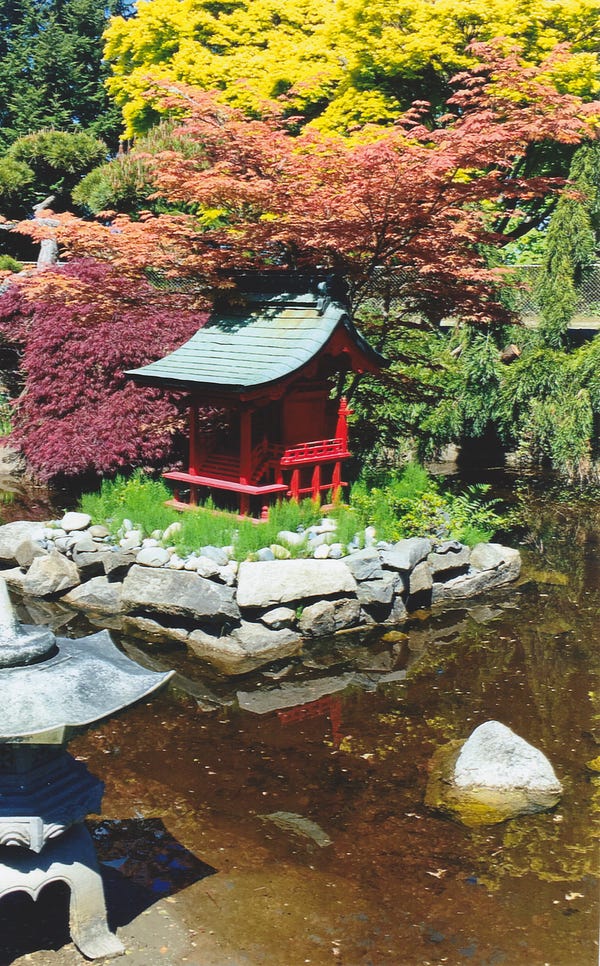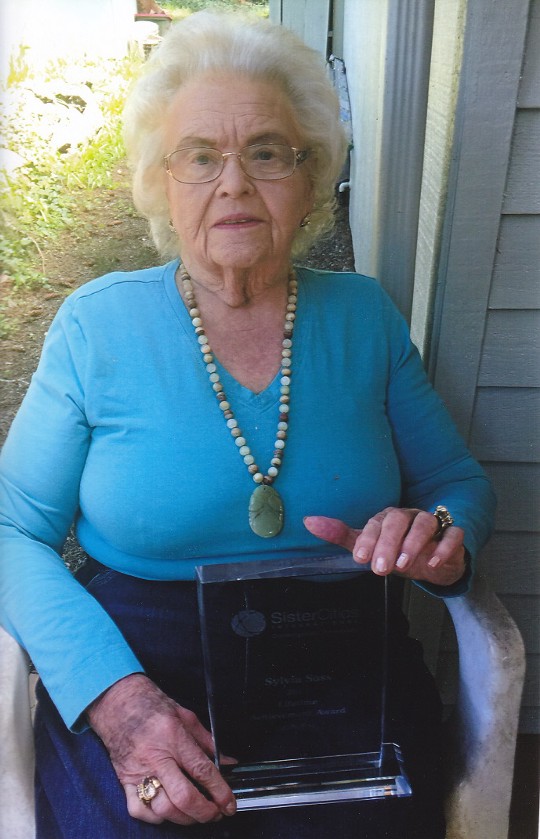By Lori Ann Reinhall
 The year was 1956 and Tacoma’s Mayor “Big John” Anderson had just returned from the White House Conference on Citizen Diplomacy in Washington, D.C. There he had convened with mayors from 40 major U.S. cities with President Dwight D. Eisenhower, and knew he was facing a formidable task: to help rebuild international relations around the world in the aftermath of the war. Big John knew that this new mission would take a powerhouse team, so he turned to one of Tacoma’s leading ladies to head up the endeavor: Sylvia B. Sass. Mrs. Sass, as she was known back then, was soon on board as the mayor’s representative for what was then known as the Town Affiliation Association, today Sister Cities International. Now, 61 years later, she remains active as an Honorary Board member and the de facto matriarch of the international organization.
The year was 1956 and Tacoma’s Mayor “Big John” Anderson had just returned from the White House Conference on Citizen Diplomacy in Washington, D.C. There he had convened with mayors from 40 major U.S. cities with President Dwight D. Eisenhower, and knew he was facing a formidable task: to help rebuild international relations around the world in the aftermath of the war. Big John knew that this new mission would take a powerhouse team, so he turned to one of Tacoma’s leading ladies to head up the endeavor: Sylvia B. Sass. Mrs. Sass, as she was known back then, was soon on board as the mayor’s representative for what was then known as the Town Affiliation Association, today Sister Cities International. Now, 61 years later, she remains active as an Honorary Board member and the de facto matriarch of the international organization.
A Woman of Substance
When you first meet Sylvia, you are struck by her articulate resolution: she is a woman who knows her own mind. It is her can-do attitude coupled with respect, dignity and sincerity that has helped her overcome obstacles along life’s way. In the 1950’s, it was unusual for women to work outside of the home, let alone serve on the board of prominent national organizations. But in her own words, Sylvia has a “reputation for doing unusual things.” While serving her community on both a local and national level, she balanced the demands of raising a family and running a corporation. In her retirement years, she is still a major player in Tacoma Sister Cities and Sister Cities International.
Sylvia was the founder of the Lakewood Alacoma Club, a non-profit center for recovering alcoholics, many of them disadvantaged women. When Sylvia sees a problem, she takes action. “I do what I do,” she says, “simply because it needs to be done.” As a woman, this has meant breaking through barriers, and Sylvia has served as a role model for the ages.
When asked about her own role model, Sylvia does not hesitate to answer that it was her own mother, the daughter of sturdy, strong-willed Icelandic immigrants. “We didn’t have an Oprah back in those days,” she remarks, “but my mother had her own life experience to share with me.” Having grown up in poverty, her mother’s dream had been to become a nurse, but with money scarce, she became a midwife instead. “She taught me to never give up and that I could do anything a man could do,” Sylvia emphatically shares.
When Sylvia was 15, she applied for a sales position at a local shoe store, the store manager told her, “We don’t hire women to sell shoes.” Discouraged but not defeated, she went home and told her mother, who promptly sent her back to the store. Sylvia told the manager that not only would she work without pay for two weeks, she would also sell more shoes than the assistant manager would during her trial period. She went home, called and sent postcards to everyone she knew, and did just that.
Early Eisenhower Days
For Sylvia, the early days of sister cities were very exciting, and she was in close contact with what was going on in Washington, D.C. and the Eisenhower administration. “Ike got it right,” Sylvia shares, “and we need to get back to his fundamental principles, the idea that if every American could make one friend overseas, we would never see another war.” The core of people-to-people diplomacy is connecting individuals with similar values and interests: teacher-to-teacher, student-to-student, artist-to-artist, researcher-to-researcher: the possibilities are endless.
With his Norwegian heritage, Mayor “Big John” Anderson pushed for a sister city in Norway, but this had to wait, with the rebuilding effort in post-war Japan taking precedence. Throughout this period, three sister cities relationships were formed between Japan and Washington state, allowing cooperative synergies between all the Japanese sister cities to develop. Sylvia quickly emerged as a prominent player in cultivating these relationships and was soon appointed Washington State Coordinator for Sister Cities International. She attended regional meetings and the bi-annual conventions, and represented SCI at annual League of Cities meetings with mayors from all over the country.
A highlight for her was the 1968 D.C. convention, when the Town Affiliations officially rebranded itself to Sister Cities International, and she was one of twelve delegates invited to have lunch with President Eisenhower. “He was a strong, powerful military man, but also a family man, very kind, very loving,” underlining again that “Ike’s impact on SCI cannot be underestimated.” Eisenhower had a particularly strong presence in Tacoma, making frequent visits to see his brother Edgar. Sylvia reminisced about how the two would play golf at the Tacoma Country Club with “a couple of bodyguards hiding behind the bushes.” She remembers the 1960’s, when there was “a tremendous respect for community service,” she urges everyone to “get back to the basics of helping one another.”

The Pagoda at Point Defiance Park was a gift from Tacoma’s sister city Kitakyushu, Japan. It is Sylvia Sass’ dream to return there to celebrate the 60th Jubilee of the two sister cities.
Eye Towards the Future
Sass understands that today, the citizen diplomacy efforts of Sister Cities International are “needed more than ever,” in a world where the motivations of politicians do not always serve the common good. Grassroots efforts helped build up U.S. society, it is just as important as it was 60 years ago to share our spirit of volunteerism and humanity abroad. “We need to turn this world around with positive thinking,” she asserts. While the Internet has made international connections faster and easier, it has also spread misinformation and fake news. She understands that stronger public relations are needed, along with financial support from individuals and corporate America. Fundraising and sound fiscal management are also important to any non-profit organization’s survival. “We live in different times now,” she says, “and there is much to be done.”
At age 87, Sylvia has an impressive list of achievements behind her: in 1988 she was honored with a medal of service from the Emperor of Japan, she is invited to attend the birthday of the Emperor at the home of the Japanese Consul General in Seattle every December, March 8 is Sylvia Sass Day in Tacoma, and on April 2 this year, she was honored with an award for lifetime achievement from Sister Cities International. “We’ve touched a lot of lives over the years with Sister Cities,” Sylvia remarks. “It’s the mission that matters,” she adds, “not any personal gratification.” When asked about which of her accomplishments stands out most, she fondly remembers the last time she was in Japan, when a student made a five-hour train ride to come and see her, and is proud that the relationships she has forged over the years are still solid.
Sylvia has plans and dreams for the future. She wants to see more young people involved with Sister Cities International again, she would advise all young people to take the opportunity to get out in the world and expand their horizons. She urges them to break the language barrier by studying a foreign language to open up new possibilities in a global economy, while serving a mission of world peace and understanding. Sylvia herself still enjoys traveling, and she is always learning new things. She particularly enjoys Tacoma’s relationship with Kitakyushu and is planning to go back to Japan to celebrate the 60th anniversary of the two sister cities. “This is what true friendship is about. It’s something lasting, something that can make a difference.” Astute observations and sage advice from someone who knows. Sylvia B. Sass has had a profound impact her own community, country and the world for over 60 years and is still going strong. We look forward to what’s to come from this venerable first lady of Sister Cities International.
Want to get stories from the network in your inbox every week? Subscribe to our news clips email here.

